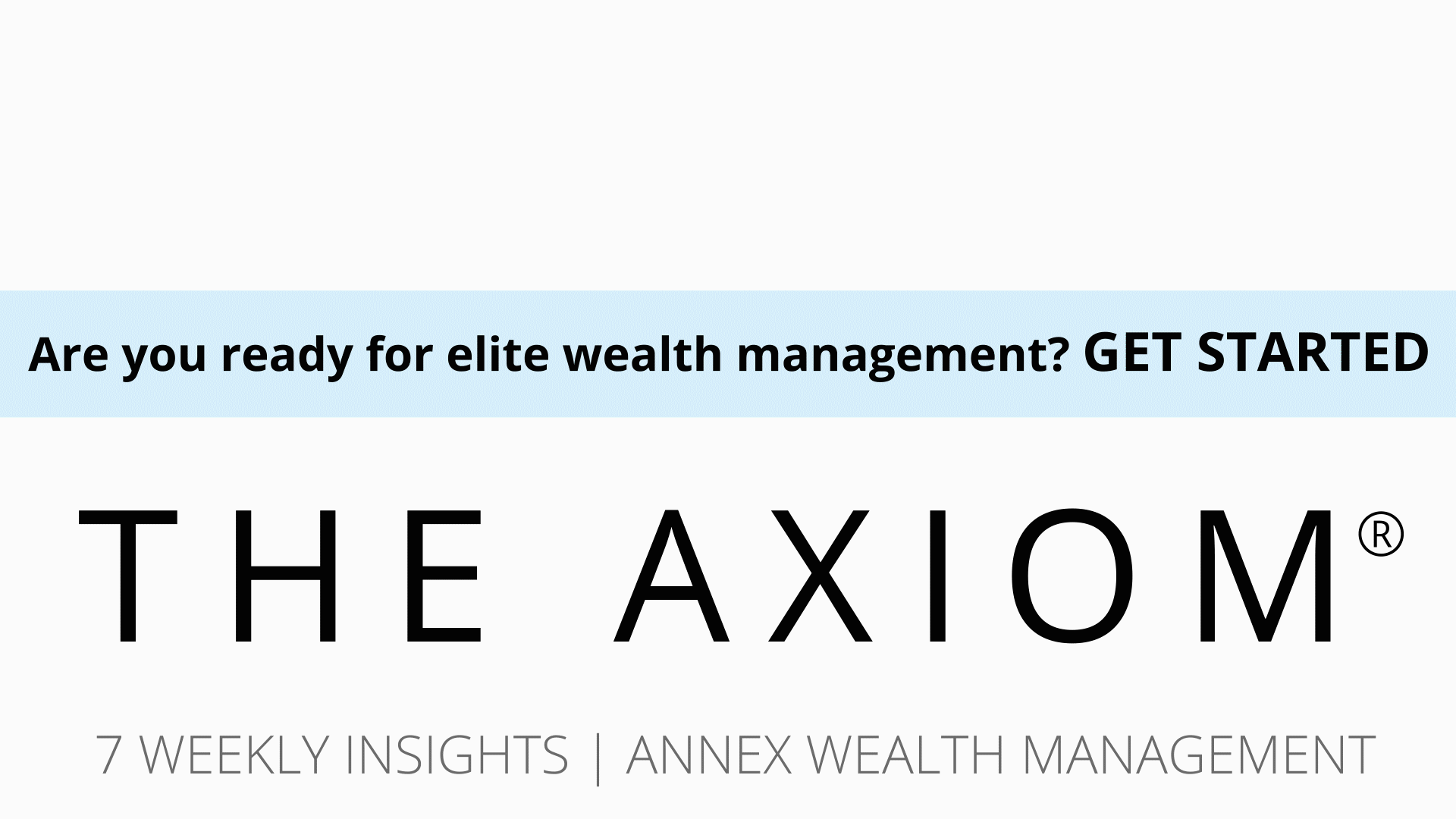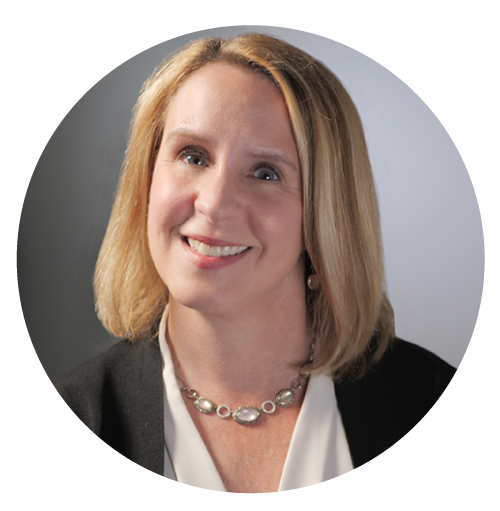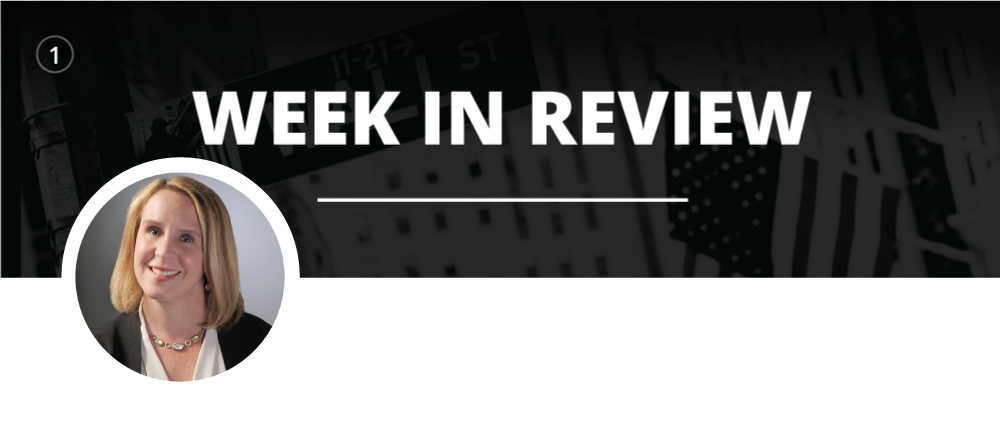
Axiom | Vol 281

Meet The Axiom®’s Guest Editor: Amy Kiiskila, JD, CFP®, CPA, CLU®
Hi! I’m Amy Kiiskila, a Wealth Manager here at Annex. Over the past 25 years, I have been fortunate to work as an auditor, an estate planning attorney, and as a leader at a Fortune 100 financial services firm. That road led me to Annex Wealth Management, where I work collaboratively with clients and members of the Annex Team to help individuals and business owners define and achieve their financial, tax, and estate planning goals.
Outside of work, I live in Wauwatosa with my fiancé. Together we have four children, which keeps us very busy! When not attending their soccer games, tennis matches, dance competitions, and theater productions, we enjoy biking, yoga and Pilates, attending concerts, and traveling. We just got back from Palm Springs and are missing the warm desert sun!
BACK TO TOP ↑

“What I like about the Axiom is that it packs a lot of information into bite-sized chunks. From breaking down current events, to answering burning questions from the audience, to keeping everyone up to date on upcoming events, the Axiom is a one-stop shop to get you ready for the week ahead.”
– Guest Editor: Amy Kiiskila, JD, CFP®, CPA, CLU® | Wealth Manager
________________________________________
The NASDAQ closed at a record high, and Goldman Sachs predicts 2022 will see unemployment plunge – but inflation may be stickier than expected. Annex Wealth Management’s Dave Spano and Derek Felske discuss.
BACK TO TOP ↑

A recent study shows that due to the pandemic our attitudes about saving and being wealthy have changed. Over the course of the next several weeks, we’re going to ask our readers some questions about what that means.
Poll | Week 2: Are You A Saver Or A Spender?
BACK TO TOP ↑

Know What You Own: Fixed Income
This week’s MoneyDo again encourages you to know what own – this time by taking a close look at your fixed income holdings.
Fixed Income refers to investments that deliver a stable flow of money, often independent of market fluctuations. Entities like corporations and governments issue debt securities to raise money, and investors purchase them. The investor receives steady income from interest payments paid to them, and then ultimately, after a term, the investor is repaid the original investment amount.
For many investors, fixed income is an afterthought. Many DIY investors neglect investing in bonds all together, sometimes because of the perception that they lack the glamour and upside that draws people to the markets. Others don’t consider them a component of an aggressive portfolio.
Here at Annex Wealth Management, we view fixed income investments very differently. Due to the size and the complexity of the bond market, we believe fixed income provides many ways to add diversification to a portfolio, and could both increase total return as well as lower overall risk.
Many investors don’t realize how big the bond market is. One recent calculation estimates that the bond market is over $40 trillion while the stock market’s capitalization is estimated at just over $30 trillion.
Since there are so many types of bonds, it’s important that you understand some fundamentals in order to know what you own. Here are just a few thoughts to consider:
Some of the old sayings about bond allocation don’t hold true.
There’s an old rule of thumb that in order to determine how much of your portfolio should be in bonds, you should subtract your age from 100, and then keep the result in stocks with the rest invested in bonds.
Today, we’re living longer and healthier, so that calculation isn’t reliable. Some financial planners would rather start with 110 or 120 instead of 100, but even then, you’ll have to consider the risk level, complexity and breadth of your portfolio first.
Long-Term Bonds tend to perform better in a rate-cutting cycle.
You’ve probably heard that when interest rates go down, bond prices go up. So, when the Federal Reserve is in a rate-cutting cycle, Long-Term Bonds tend to perform better. Conversely, when the Fed raises rates, Floating Rate bonds will benefit, as they are bonds that reset their interest rate periodically, which would benefit by having higher coupon payments when rates go up.
Note the claim status on the bond.
In the event of bankruptcy, bond investors typically have first claim to a company’s assets – meaning there’s a chance you could be made whole in this circumstance. But, different bonds have different claims, including senior notes and subordinated debentures.
Take a look at the type of bond you own, including the certificate, if you can – or take a look at the prospectus for the investment.
Consider where we are in the economic cycle.
Is the economy growing, which would lead to low default rates in corporate debt? It’s likely that in a growing economy, high-yield bonds would tend to outperform, as they are loans given to companies with less-than-stellar credit ratings, and in turn have higher coupon rates. When the economy is growing, the risk level for high-yield bonds is lower than in a normal or shrinking economy.
However if the economy is in a recession, it would be reasonable to expect a increased chance for default, where companies would be unable to pay back their debt, making high-yield bonds a less attractive investment.
Make sure to study the company’s history.
The good news – you’ll encounter plenty of data to help you understand a company’s past performance, including its ability to pay taxes, pensions and other obligations.
The rough news – scouring old reports, including its MD&A (management discussion and analysis) section – is time consuming. A wise investor will spend the time to get to know just who you’re invested in. Make sure you budget some patient time for this level of investigation.
Some fixed income investments have equity components to them.
Just like when you’re grocery shopping – you have to read the label to know what’s inside. Some investors figure that the word “Bond” in the investment’s name means that it’s 100% bond. That’s not always true.
Convertible Bonds are a corporate bond that give the investor the option to convert the bond to shares of common stock. A set price is given and if the stock is above this price then investor might want to flip the bond for the stock. If the stock is below this conversion price, then you may want to keep holding the bond and receive the coupon payments.
Preferred stock is another fixed income investment with equity components. Make sure you understand the intricacies of preferred stock. For example, if the company undergoes bankruptcy as mentioned above, preferred stock falls beneath a corporate bond and above a common stock in the priority list of who has claim on company assets. But, preferred stock pays a higher dividend than the common stock does.
Those are just a few of the many considerations you should make as you wade into this deep, but rewarding investment area. Fixed Income investments require just as much – or more – research and analysis as your other investments. Besides the investments themselves, there are so many ways to invest within the bond market, and each has its benefits.
It may be tough to come to a firm understanding of all of the pros and cons, but the time spent is worth it. With a broader understanding of what you own, you’re better prepared to effectively use fixed income investments to provide the stability and value within your portfolio.
As always, if you feel like you’re Sysiphus, pushing the research and analysis ball up the investing mountain each quarter, find an advisor you can trust to help you determine how much and what fixed income investments you should hold. We take a lot of pride in empowering folks to make stronger decisions for their future.
BACK TO TOP ↑

This week’s Ask Annex comes from Paul, who asks:
“You’ve spoken about a possible inflation hedge like real estate, how can I participate without actually buying any real estate?”
_________________
We asked Annex Wealth Management’s Dave Spano, CFP® and Derek V.W. Felske, CFA®:
BACK TO TOP ↑

Annex Wealth Management’s investment decisions are guided by its Investment Policy Committee. Annex’s Investment Policy Committee is headed by its Chief Investment Officer and its Chief Investment Strategist, and includes firm leadership, along with members of the Annex investment team. The Investment Policy committee meets regularly to monitor, report, and discuss investment decisions.
Annex Wealth Management builds diversified, disciplined portfolios for specific risk categories ranging from conservative to aggressive growth and/or specific portfolio objectives such as income, capital preservation, or capital appreciation.
Meet the Investment Policy Committee HERE.
BACK TO TOP ↑


KNOW THE DIFFERENCE MINUTE:
Will You Be Getting A Raise In 2022?
KNOW THE DIFFERENCE MINUTE:
We’re Not Driving This Thanksgiving
ANNEX RADIO
Stuff Tom Hears | 401(k) Services
BACK TO TOP ↑

Annex Wealth Management provides free workshops, open to the public, on key wealth management topics.
Check back soon for new events!Missed one of our events? Watch it HERE.
BACK TO TOP ↑